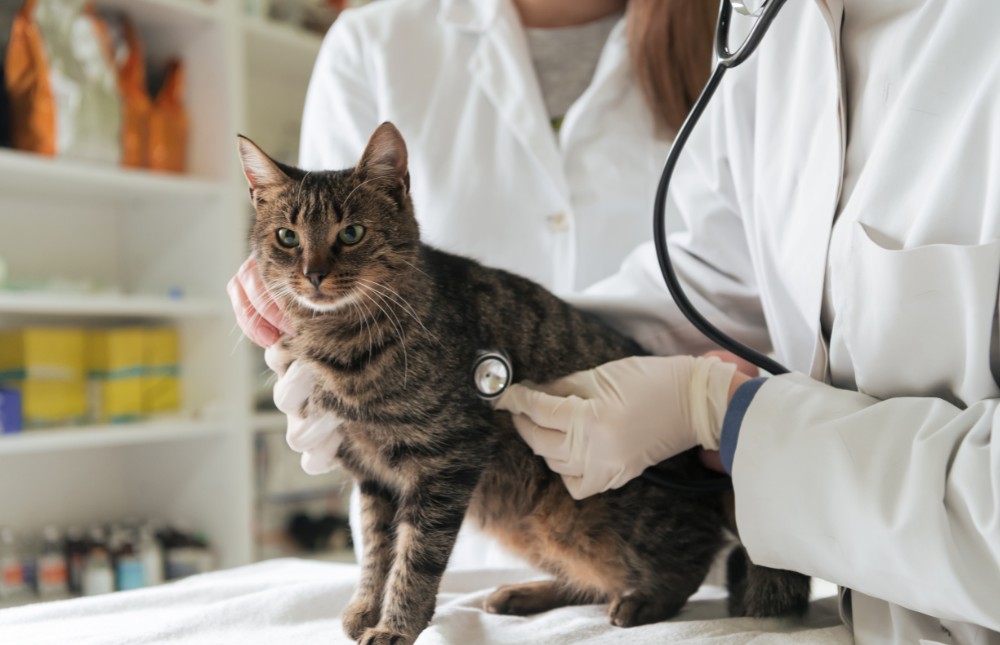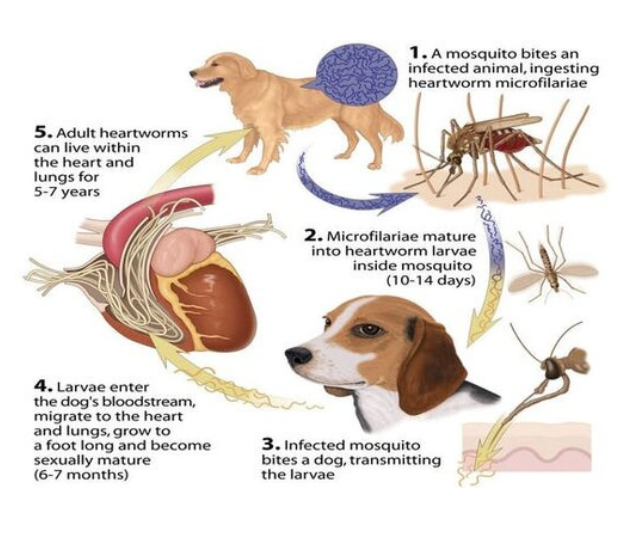Pet Heartworm Prevention & Detection atAnimal Hospital of Tiffin
Understanding Heartworm Disease
Heartworm disease is caused by a parasitic worm called Dirofilaria immitis, transmitted through an infected mosquito’s bite. Once inside the host, the larvae mature into adult heartworms, which can grow up to a foot long and live in the heart, lungs, and blood vessels. This can lead to severe damage to these organs, ultimately resulting in heart failure, lung disease, or other serious health issues.
Dogs are the most common hosts for heartworms, but cats and other animals can also be affected. The disease can be more challenging to diagnose in cats, and even a small number of heartworms can cause significant health problems.
The Importance of Prevention
Preventing heartworm disease is far easier and more cost-effective than treating it once an infection has occurred. At Animal Hospital of Tiffin, we emphasize the importance of year-round heartworm prevention to safeguard your pet’s health. Our veterinarian will work with you to develop a prevention plan tailored to your pet’s specific needs.
Key Preventative Measures Include:
We provide safe and effective heartworm preventatives that are administered monthly. These medications work by killing heartworm larvae before they can mature into adults.
Regular heartworm testing is essential, even if your pet is on preventative medication. Testing ensures that the prevention plan is working and that your pet has not been exposed to heartworms.
Early Detection and Testing
Despite the best preventative efforts, pets can still become infected with heartworms. That’s why regular testing is crucial to our approach to pet heartworm prevention and detection. Early detection allows for prompt treatment, significantly improving the chances of a successful recovery.
Testing Procedures Include:
A simple blood test can detect the presence of heartworm proteins in your pet’s bloodstream. This quick and reliable test makes it a valuable tool in our diagnostic process.
If a test result is positive, further testing may be necessary to determine the severity of the infection and the appropriate course of treatment.
By detecting heartworm disease early, we can manage the condition more effectively and reduce potential complications.
Comprehensive Care at Animal Hospital of Tiffin
At Animal Hospital of Tiffin, we proactively approach your pet’s health. Our team is dedicated to providing comprehensive care that includes both prevention and early detection of heartworm disease. We understand how much your pet means to you and are here to help you protect them from this serious condition.
Our Services Include:
These plans are tailored to your pet’s specific needs and include recommendations for the most effective preventative measures.
We offer reliable testing options to detect heartworms early, ensuring your pet receives the care they need.
If your pet is diagnosed with heartworm disease, we provide the necessary treatments and ongoing support to help them recover.
What is heartworm disease?
Heartworm disease is caused by foot-long worms (Dirofilaria immitis). It’s a serious and potentially fatal disease in pets in the United States and many other parts of the world.
Heartworm lives in the:
- Heart
- Lungs
- Blood vessels
Heartworm causes:
- Severe lung disease
- Heart failure
- Damage to other organs
Heartworm disease affects:
- Dogs
- Cats
- Ferrets
- Wolves
- Coyotes
- Foxes
Because wild species such as foxes and coyotes live in proximity to many urban areas, they are considered important carriers of the disease.
What are the stages/signs of heartworm disease?
Stage 2: Moderate symptoms, including intolerance for exercise and a more lingering cough. The heartworms have been present long enough in the body for antibody production and probable microfilariae production. During this phase, heartworm disease may be detected with blood tests.
Stage 3: Very noticeable and greatly impacts your dog’s health. Dogs that continue to cough and experience fatigue after exercise may be reluctant to exercise and have trouble breathing. During this stage, dogs may also cough up blood. By stage three, the disease is quite evident on X-rays. The worms in the heart and large vessels will be obvious on X-rays.
Stage 4: Very visible heartworm disease symptoms. These symptoms are accompanied by long-term implications for the dog’s health. These dogs are very ill. The symptoms are similar to Stage 3 but more severe. Dogs will be reluctant to exercise, tired after exercising, and exhibit a cough. They will probably experience trouble breathing as well. Testing may reveal the impact of the disease in the form of abnormal sounds within the dog’s heart and lungs and an enlarged liver. Even with treatment, this stage of the disease carries a high risk of long-term debilitation and possible death.
How do we test for heartworm disease?
Blood Parasite Screen 4Dx Plus Idexx Snap Test, also known as ‘the heartworm test,’ efficiently this test for heartworm disease and tick-transmitted pathogens. Test annually to help prevent the spread of:
- Heartworm (spread by mosquitoes)
- Ehrlichiosis (spread by ticks)
- Lyme disease (spread by ticks)
- Anaplasmosis (spread by ticks)
For more info on ticks, click here.
What types of prevention are available?
If you have a hard time remembering to give the monthly prevention, we have great news! We offer ProHeart 6.
ProHeart 6 (moxidectin) – Is the Only Vet-Administered injection to prevent heartworm disease in dogs 6 months of age and older for 6 FULL months.
ProHeart 6 also treats common hookworm infections your dog may have during injection.
Topical is a prescription solution administered on the skin monthly.
For dogs, apply on the back of the neck/shoulder blades.
For cats, apply at the back of the head where they are less likely to reach with licking.
Advantage Multi (imidacloprid/moxidectin) –. Treats and controls heartworm disease, roundworms, hookworms, and whipworms. This product also kills and prevents fleas and sarcoptic mange.
Revolution (selamectin) – Treats and protects dogs against fleas, American dog ticks, ear mites, heartworm disease, and sarcoptic mites.
Treat and protect cats against fleas, ear mites, heartworm disease, roundworms, and hookworms.
Oral is a prescription medication given by mouth each month.
Heartgard Plus (ivermectin/pyrantel) – A beef-flavored chewable that is given monthly. It also treats and controls roundworms and hookworms.
Interceptor Plus (milbemycin oxime/praziquantel) – A chicken-flavored chewable that is given monthly. It also treats and controls roundworms, hookworms, whipworms, and tapeworms.
Simparica Trio (sarolaner/moxidectin/pyrantel) – A liver-flavored chewable tablet that is given monthly. Also treats and controls roundworms, hookworms, fleas, and five types of ticks.
We can discuss your preferences and your pet’s lifestyle to choose the best product for you. Look for rebates and sales on our Online Pharmacy.
How is heartworm disease transmitted?
It all comes down to the mosquito!
Let us explain:
Adult female heartworms living in an infected animal produce microscopic baby worms called microfilaria that circulate in the bloodstream. When a mosquito bites and takes a blood meal from an infected animal, it picks up these baby worms, which develop and mature into “infective stage” larvae over a period of 10 to 14 days. Then, when the infected mosquito bites another dog, cat, or susceptible wild animal, the infective larvae are deposited onto the surface of the animal’s skin and enter the new host through the mosquito’s bite wound. Once inside a new host, it takes approximately 6 months for the larvae to mature into adult heartworms. Once mature, heartworms can live for 5 to 7 years in dogs and up to 2 or 3 years in cats. Because of the longevity of these worms, each mosquito season can lead to an increasing number of worms in an infected pet.
Why do we recommend testing if my dog is already on prevention?
Annual testing ensures:
- The prevention program is working. If you don’t test, you don’t know how to treat.
- Heartworm medications are highly effective at prevention but not 100% effective.
- If one dose is missed, it leaves them unprotected.
If the dog has been OFF prevention for 2 months or longer, then re-testing (3 tests) will need to be performed:
1st test: At that time
2nd test: Again in 6 months
3rd test: Again, on the one-year anniversary date of the initial test
After all 3 tests are completed, then test annually.
*Important* Giving heartworm preventatives to a heartworm-positive dog can cause adverse reactions and be fatal. This is why we require an up-to-date heartworm test to purchase prevention.
Why do we recommend year-round heartworm prevention?
With monthly preventions, each product prevents some intestinal parasites.



